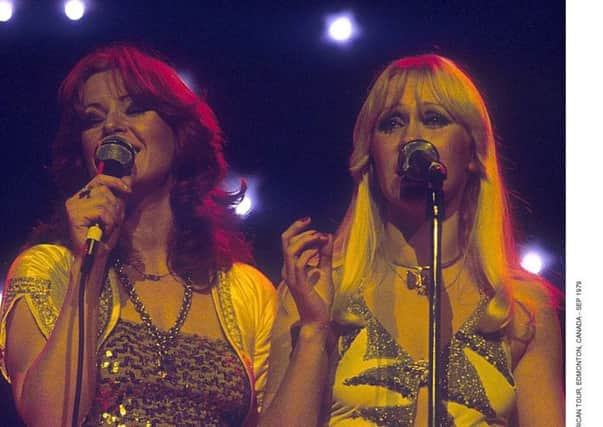Aidan Smith: If Abba can remain forever young, will Morrissey be next?


Rock snob that I used to be, I would laugh when Abba appeared on Top of the Pops. Laugh and secretly fancy Anni-Frid Lyngstad, that is.
The grinning fool on guitar would make me chuckle, as would the spangliness of the jumpsuits. Then there were the lyrics. “Does your mother know that giraffe? … Steve McQueen on the tambourine … You’ll be dancing once again like a baby hen”. What on earth were they on about? Something, quite a few things, appeared to get lost in translation when performed in those singsongy Swedish accents. Unless of course, Fernando really was a track about a hard-hearted toff indifferent to the plight of those less fortunate who undergoes an empathy transplant: “And I’m not ashamed to say/The roar of council tenants almost made me cry.”
Advertisement
Hide AdI would sneer at how “pop” Abba were, how easy-pleasey their melodies, how unpretentious their philosophy – and of course how many dolts seemed to find this cheap music so potent. I would scoff: “You probably called yourselves Abba so you’d appear first in the record racks – well, not where I buy my elpees, you’re not. There’s a prog-rock act known as Aardvark and it hardly matters they no longer exist, probably due to them being rubbish. Put that in your pipe and smoke it, along with your herring.”
Then Abba no longer existed only their music didn’t go away. It soundtracked every wedding and office party. It filled the floor at 40th birthday bashes, then 50th ones, and if you’re about to turn 60 you’re probably preparing your playlist and as sure as night follows night in Sweden, as sure as vigorous birch-twig thrashings follow extended sessions in the sauna, Dancing Queen will be on it. None of us can fight this, not even rock snobs. Part of the enduring appeal of Abba is the innocence and exuberance of the music, reminding fans of when they were innocence and exuberant. Part of it is the fascination for Sweden and Swedishness: Greta Garbo, Ingmar Bergman, Ulrika Johnsson, Alfred Nobel and his famous prize, the meatballs at Ikea, all those kids not going to school until they’re 25 and what the entire country does for fun during the interminable darkness. And another part is that the group have never reformed, not even for the $1 billion offered them in 2000. But now they have and I think it could be a huge mistake.
A Christmas TV spectacular will be a prelude to a world tour in 2019. New songs have been written, which is always a risk. But the bigger risk is that Abba won’t actually be turning up for this reunion: they’ll send avatars, or “Abbatars”, instead.
This virtual reality version of the band sounds like a giant swizz. If the faithful are to be subjected to booking-fee fleecing, over-priced warm beer, aircraft-hangar ambience, new material and long delays getting out of the car park, then surely the pop icons should present themselves on stage.
Digital Abba will also be “de-aged” to appear as they looked at their musical peak in 1979. Again this seems highly unfair. Possibly you achieved your own apotheosis the year Jim Callaghan declared “Crisis, what crisis?” only to be usurped by Maggie Thatcher, but the chances are you’ve suffered a few crises of your own since. Abba still get to fill their jumpsuits in all the right places but the audience must go EasyFit.
This seems like the band trying to refute the cold, hard facts of them being aged between 68 and 72. Surely we want our idols to grow old with us, rather than to pretend otherwise. We expect them to look more grizzled, we want their voices to have cracked. Not totally shot, but to be able tell their own story of long careers and the attendant highs and lows.
Advertisement
Hide AdGazing up at the original heroes, the first posters on the bedroom wall, when maybe all they’ve done to stem the advancing years is the odd nip and tuck plus a slooshing of hair dye, brings poignancy to these reunions – some kind of consolation after you’ve forked out 15 quid for a concert programme. And anyway, while this might be a generalisation, don’t Swedes age better than most around the world, doubtless because of the state-decreed truancy and all that herring?
Abba’s Bjorn Ulvaeus says the reason for choosing 1979 was simple: “We thought we looked good that year.” He promises a mind-boggling experience, adding: “You’ll hear the voices of Abba coming out of the Abbatars. You won’t be able to see that they’re not human beings. It’ll be spooky, I assure you, but great fun.”
Advertisement
Hide AdIf he’s right in his prediction and concert-goers embrace the concept, then bands may never have to leave their rockbrokerbelt mansions and private island hideaways again. They’ll be spared the tedium and cost of touring. They won’t have to get too close to the great unwashed, which is a misnomer, because the mature music fan always turns up well-scrubbed.
All bands get back together eventually. Well, apart from Abba, the Smiths and Oasis, it seemed. Now maybe the latter two will follow the example of the Swedish Super Troopers and time-trap favourite incarnations of themselves for their own virtual shows. You can certainly see Morrissey being attracted by the idea of adoring audiences forever fixated on his bottom when it fitted into 28-inch waist jeans and the gladioli sat happily in his back pocket.
But if bands are going to go this way then surely fans should be allowed to follow suit. Instead of enduring all the rubbish bits of a night with their musical favourites they could offer themselves virtually from when they looked their best and went the craziest down the front of the stage.
